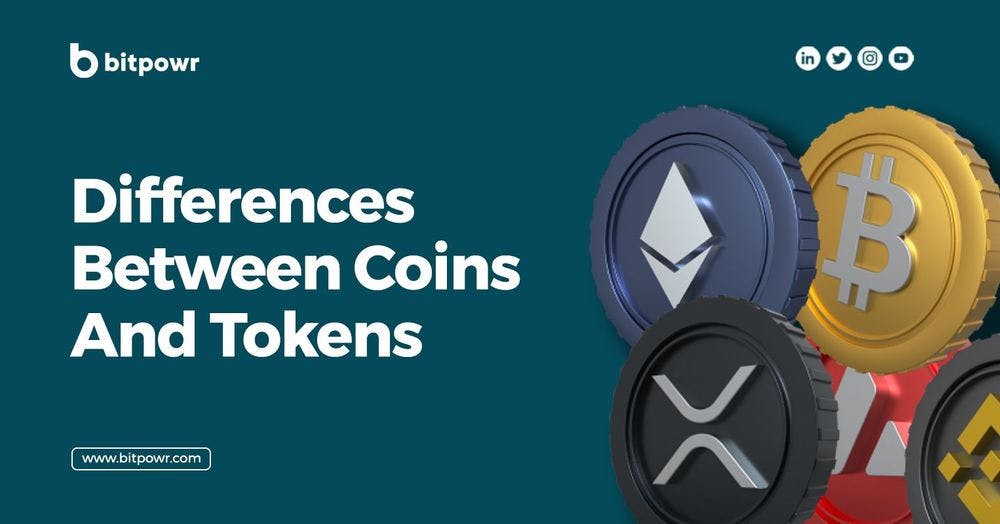Coins
Coins are digital assets that have their own independent blockchain networks, similar to traditional currencies like the US Dollar or Euro.
They are designed to be used as a medium of exchange, with the primary purpose of storing value and facilitating transactions.
Examples of coins include Bitcoin (BTC), Ethereum (ETH), and Cardano (ADA)
Coins can be created through various consensus mechanisms, such as Proof of Work (PoW) or Proof of Stake (PoS).
They are often used for general transactions and value preservation, making them suitable for everyday use and long-term investment.
Tokens
Tokens, on the other hand, operate on existing blockchain networks instead of having their own independent blockchains.
They are built on top of other blockchains, such as Ethereum, and are designed to provide utility and functionality within specific ecosystems.
Tokens can represent various assets or features, such as ownership in a Decentralized Autonomous Organization (DAO), digital products, or even physical objects.
Tokens are often used to power decentralized applications (DApps) and can be traded like coins on various cryptocurrency exchanges.
They are more suitable for specific purposes and value creation, making them essential for interacting with DApps and participating in decentralized finance (DeFi) projects.
Key Takeaways
In summary, coins are native to their own blockchain networks and are designed for general transactions and value preservation, while tokens are built on top of existing blockchains and provide utility and functionality within specific ecosystems. Both coins and tokens play crucial roles in the cryptocurrency market, enabling a wide range of use cases and applications.
What Are Cryptocurrency Coins and Their Common Uses?
The terms “coins” and “tokens” are often used interchangeably, especially among newcomers to the industry. However, it is essential to understand that coins and tokens are not synonymous; they possess unique characteristics and serve distinct purposes, despite both being instrumental in enabling value exchange within decentralized systems.
In essence, coins represent digital currencies that are native to their respective blockchain networks. For example, Bitcoin (BTC) functions as the native coin for the Bitcoin blockchain, Ethereum (ETH) for the Ethereum network, and XRP for Ripple. The value of these coins is intricately tied to user activities within their respective ecosystems, including factors like transaction volumes, user engagement, and overall demand. Increased usage typically correlates with higher prices due to heightened demand. While external factors can also impact coin prices, they are beyond the scope of this discussion.
On the other hand, cryptocurrency tokens are specifically created to support decentralized projects by leveraging existing blockchain infrastructures through smart contracts. Tokens offer a range of functionalities tailored to specific platforms and blockchains, encompassing utility features, governance mechanisms, and security protocols. In summary, while both coins and tokens play vital roles in the crypto landscape by facilitating transactions and leveraging distributed ledger technology, they operate on different principles and cater to diverse use cases.
What Are Cryptocurrency Tokens and Their Common Uses?
Cryptocurrency tokens are digital assets that are built on existing blockchain networks, unlike coins that have their own independent blockchains.
Tokens can represent various assets, from physical objects to virtual currencies, and are often created through processes like Initial Coin Offerings (ICOs).
These tokens play a crucial role in powering decentralized applications (DApps) and can offer functionalities such as utility, governance rights, and access to services within specific platforms and blockchains.
Common uses of cryptocurrency tokens include:
- Representing assets like physical goods or currencies.
- Providing access to services or applications within decentralized ecosystems.
- Enabling users to participate in governance processes.
- Facilitating cross-chain functionality and interoperability.
- Serving as tradable and transferable assets among participants in blockchain networks.
Are Stablecoins, Coins or Tokens?
Another class of digital assets worth noting is Stablecoins, which, as the name suggests, must maintain a stable value to fall under this category. This stability is often achieved by pegging them to various assets, which acts as a guarantee for maintaining constant levels. For example, USDT is a Stablecoins linked to the value of the US dollar, meaning that 1 USDT is roughly equal to $1 USD.
One distinctive aspect of Stablecoins is that the majority of these assets operate on the Ethereum blockchain through smart contracts. In reality, they are considered ERC-20 tokens as they lack their own independent blockchains. As discussed earlier, all coins are associated with their own blockchains and are native to their respective networks, which makes Stablecoins an exception to this rule.
At Bitpowr, we offer ready-to-deploy blockchain infrastructure that financial institutions including banks and fintechs can plug into to simplify cross-border remittances, expand their customer base, and grow their revenue. Reach out to us to learn more.




